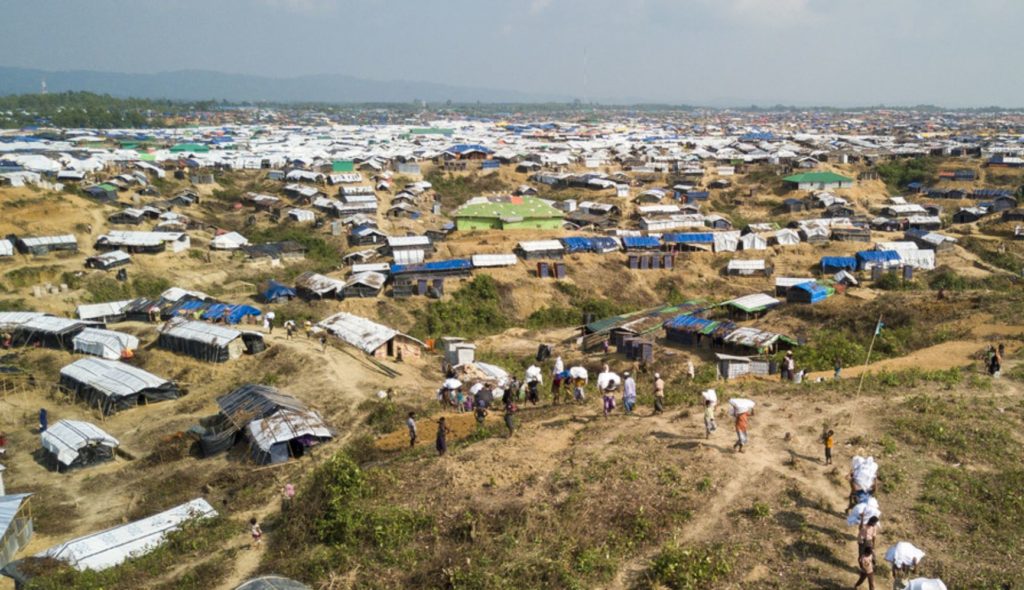Rohingya refugees continue to suffer one calamity after another. Last week, a fire blazed through a cramped refugee camp in southern Bangladesh, destroying health centers, learning facilities, and mosques, leaving approximately 12,000 Rohingya without shelter. The fire occurred at Camp 11 of the Cox’s Bazar refugee camp, which houses over 1 million Rohingya refugees, including 700,000 who escaped Myanmar after a military crackdown in 2017.
The majority of the Rohingya exodus occurred due to a horrific campaign of slaughter, rape, and destruction, which was eventually recognized as a genocide by the United States. This forced over 700,000 Rohingya to flee across the border with Bangladesh, where previous waves of refugees had also sought shelter. Despite the Rohingya community having a rich and deep history in Myanmar, the state regarded them as ethnic Bengali interlopers with no rightful claim to citizenship.
The Rohingya refugees in Bangladesh are still grappling with the traumas inflicted upon them in Myanmar and are now facing new pressures. Recently, a wave of violence has been sweeping through the southeast Bangladesh camps where the Rohingya have sought refuge, six years after the Myanmar military conducted a genocidal campaign against its Rohingya Muslim minority.
Today, the Rohingya find themselves stranded in a dangerous and concerning state of uncertainty for over five years since the military crackdown in Myanmar. The military coup in 2021 has escalated the conflict in the country, making the possibility of a secure return for the Rohingya a far-off possibility.
While there are some efforts to assist the Rohingya, not enough is being done to ensure their health and safety. UN Human Rights Council-appointed experts called for donors worldwide to give generously to the UN World Food Programme (WFP) Rohingya Refugee Response fund after the UN announced it did not have enough funds to maintain food aid to the Rohingya.
“The planned rations reductions are the devastating consequence of the international community’s failure to provide funding for initiatives that address the fundamental needs of Rohingya refugees”, the two Special Rapporteurs said in a statement. “Rations will be slashed for Rohingya refugees starting in a few weeks, just before Ramadan. This is unconscionable.”
WFP declared that it will decrease rations for Rohingya refugees by 17% in March. It has also cautioned that if additional funding is not secured by April, more significant reductions will be required. The WFP is requesting $125 million in funding to address this situation.
“If these cuts are made, they will be imposed on vulnerable people who are already food insecure,” the UN representatives said. “Acute malnutrition levels remain high, and chronic malnutrition is pervasive among the Rohingya refugee population in Bangladesh, with more than a third of children stunted and underweight.”
The Rohingya question is a crisis that demands a resolution as soon as possible. According to UNICEF, “The Rohingya rely entirely on humanitarian assistance for protection, food, water, shelter and health, and they are living in temporary shelters in highly congested camp settings.”
UNICEF also notes that while basic services have been provided, children still face disease outbreaks, malnutrition, inadequate educational opportunities and the risks related to neglect, exploitation, violence, child marriage and child labour. Meanwhile, annual cycles of heavy monsoon and cyclones pose substantial risks to both Rohingya refugees and host communities.
In Myanmar, most Rohingya have no legal identity or citizenship and statelessness remains a significant concern. Rohingya children in Rakhine State, meanwhile, have been hemmed in by violence, forced displacement and restrictions on freedom of movement.
Until the conditions are in place in Myanmar that would allow Rohingya families to return home with basic rights – safety from violence, citizenship, free movement, health and education – they are stuck as refugees or internally displaced persons living in overcrowded and sometimes dangerous conditions.
Adolescents and older children who lack access to education and employment opportunities are at risk of becoming a “lost generation,” vulnerable to exploitation by traffickers and those with political or other motives. In particular, girls and women face a heightened risk of gender-based violence, such as early marriage and exclusion from school.
To assist Rohingya children, UNICEF has been present in the refugee camps in Bangladesh since the beginning and continues to provide clean water, healthcare, protection, nutritious food, and education to every child in need. It is crucial that the rights and dignity of Rohingya refugees are respected, protected, and promoted. Now, the international community must step up and focus less on gender issues or climate change and instead fulfill its obligations to protect the world’s needy. Providing education, healthcare, clean water and sanitation, and livelihood opportunities will prepare the Rohingya refugees to return to their homeland and lead a dignified life.
Become a Patron!
Or support us at SubscribeStar
Donate cryptocurrency HERE
Subscribe to Activist Post for truth, peace, and freedom news. Follow us on SoMee, Telegram, HIVE, Flote, Minds, MeWe, Twitter, Gab, What Really Happened and GETTR.
Provide, Protect and Profit from what’s coming! Get a free issue of Counter Markets today.


Be the first to comment on "The Ongoing Tragedy of the Rohingya Crisis"